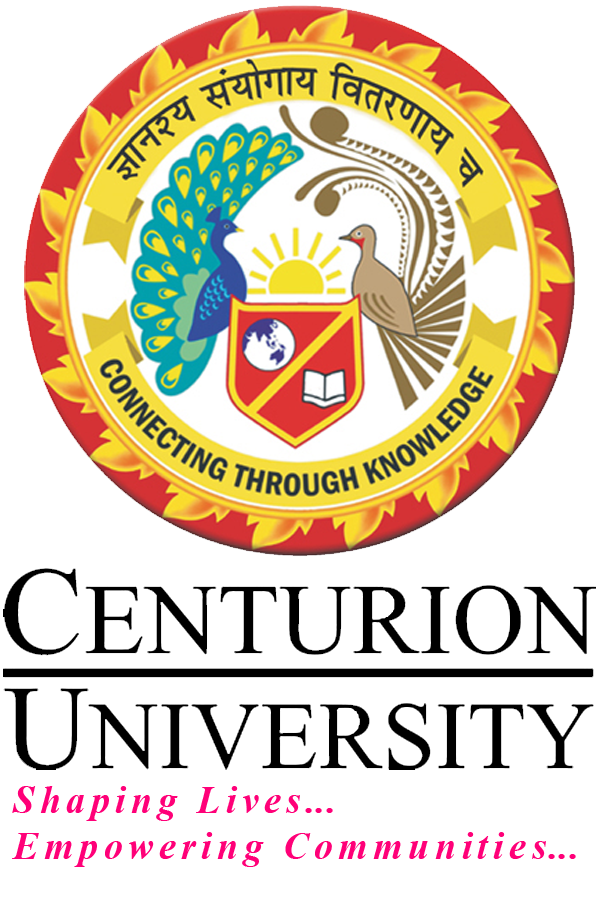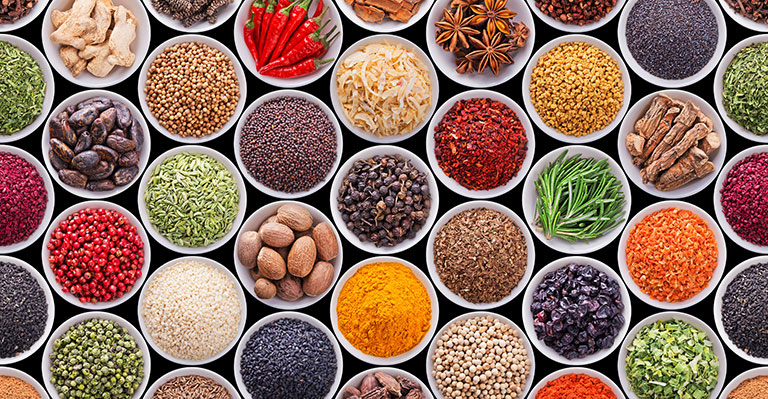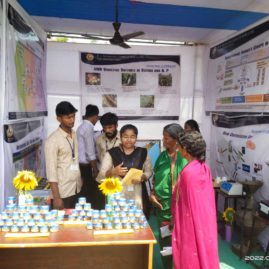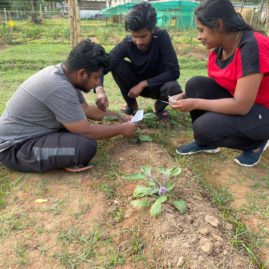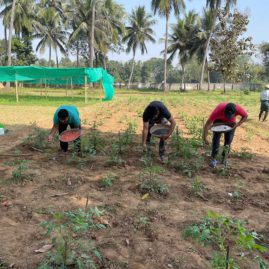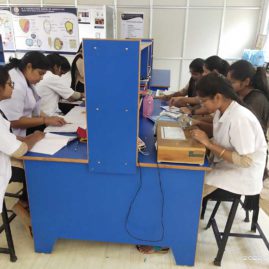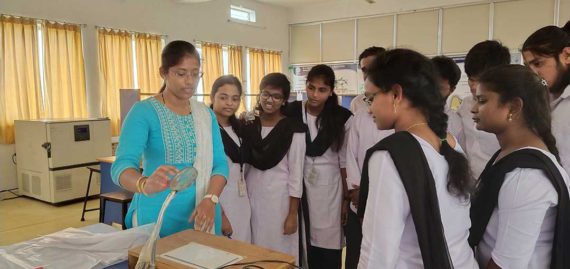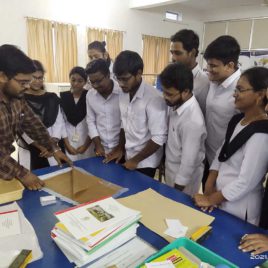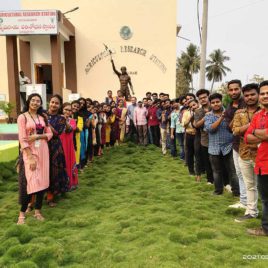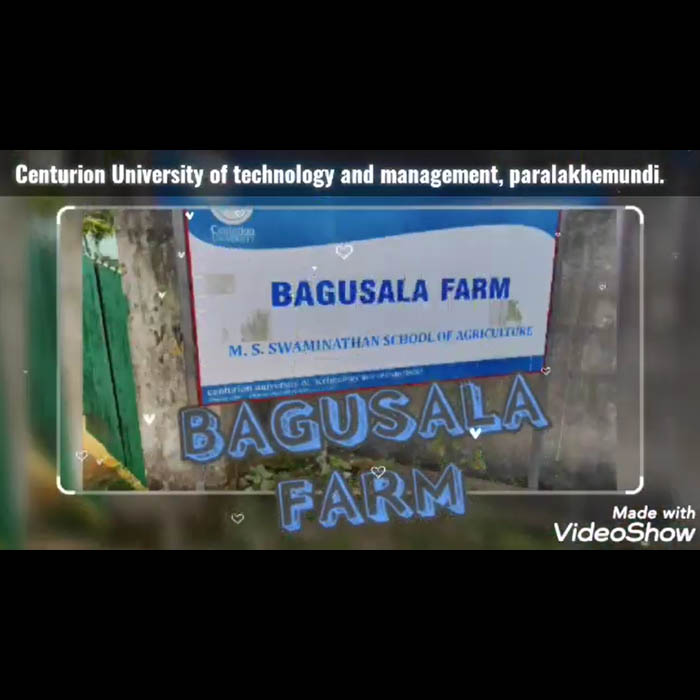- To acquaint students with conventional and modern breeding methods and its viable application in varietal development
- To impart a comprehensive knowledge of seed production in vegetable and cereal crops with adequate practical training
- To apprise students with the legislative provisions and processes as well as the mechanisms of quality control and seed certification
Seed Production Using Manual and Molecular Methods
Domain Track : Seed Production Using Manual and Molecular Methods
Course Attendees
Still no participant
Course Reviews
Still no reviews
Credits (T-P-P): 3-15-11 (29 credits)
Domain Track Objectives:
Domain Track Learning Outcomes:
At the end of this domain, students will enrich their Experiential Learning, practical knowledge and hands on training on
- Emasculation and pollination technique for hybrid seed production
- Application of molecular marker in seed production
- Variety and hybrid seed production of cereals and vegetable crops
- Physical and genetic purity test of quality seed production
- Various methods of seed extraction and
- Seed certification process
Courses Division:
- Breeding methods: conventional and molecular approach (1-2-0)
- Seed production of vegetable and cereals crops (1-2-0)
- Seed certification (1-2-0)
- Hybridization techniques (0-3-0)
- Vegetable Seed production (0-3-0)
- Cultivar purity and seed quality testing (0-3-0)
- Practices in Units/Field/Lab/Project (0-0-11)
Domain Syllabus:
Theory
- 1.1. Classification of Plant Breeding methods
- 1.2. Genetic basis and breeding methods in self- pollinated crops
- 1.3. Hybridization techniques and handling of segregating population
- 1.4. Genetic basis and breeding methods of cross-pollinated crops
- 1.5. Heterosis and inbreeding depression
- 1.6. Hybrid breeding- steps /operations in production of hybrid varieties
- 1.7. Male sterility and its application in hybrid seed production
- 1.8. Breeding methods in asexually propagated crops
- 1.9. Special breeding techniques: Mutation breeding
- 1.10. Special breeding techniques: Breeding for abiotic stresses
- 1.11. Special breeding techniques: Breeding for biotic stresses
- 1.12. DNA markers and its application in plant breeding
- 1.13. Marker assisted selection (MAS) and QTL
- 1.14. Cultivar development-variety testing procedures, release and notification system in India and IPR
Practical
- 1.1. Emasculation and hybridization techniques in Rice
- 1.2. Emasculation and hybridization techniques in maize
- 1.3. Emasculation and hybridization techniques in vegetable crops: Tomato
- 1.4. Emasculation and hybridization techniques in vegetable crops: Okra
- 1.5. Emasculation and hybridization techniques in vegetable crops: Brinjal
- 1.6. Handing of segregating populations
- 1.7. Designs used in plant breeding experiment: RBD analysis
- 1.8. Estimation of heterosis, inbreeding depression and heritability
- 1.9. Learning techniques in hybrid seed production using male-sterility in field crops
- 1.10. Use of male sterility in hybrid seed production: Rice
- 1.11. Genetic Mechanisms for Hybrid Seed Production in vegetable crops
- 1.12. Visit to AICRP plots to know about different trials for cultivar development
- 1.13. DNA isolation, DNA purity and quantification tests
- 1.14. DNA finger printing using PCR-based DNA markers
- 1.15. Gel electrophoresis
- 1.16. Gel scoring and data analysis for tagging and phylogenetic relationship
- 1.17. Use of standard MAS procedures- screening crops for resistant to different biotic stress traits
- 1.18. Use of standard MAS procedures- screening crops for resistant to different abiotic stress traits
Suggested Readings
- Allard, R.W.1960. Principles of Plant Breeding. John Wiley & Sons, New York
- Caetano-Anolles G & Gresshoff PM. 1998. DNA Markers: Protocols, Applications and Overviews. Wiley-VCH.
- Chopra VL. 2001. Breeding Field Crops. Oxford & IBH.
- Kalloo, G.1994, Vegetable Breeding, Panima Educational Book Agency, New Delhi
- Singh,P. 2006, Essential of Plant Breeding. Kalyani Publishers, Ludhiana
- Singh B. D. 2006. Plant Breeding. Kalyani Publishers.
2. Seed production of vegetable and cereals crops (1-2-0)
Theory
- 2.1. Importance and scope of vegetable seed production in India
- 2.2. Planning for certified, foundation and breeder seed production
- 2.3. Seed quality: Certification standards for self and cross pollinated and vegetatively propagated crops
- 2.4. Principles of seed production in vegetable crops
- 2.5. Seed production in varieties and hybrids of cereals crops: rice and maize
- 2.6. Seed production in varieties and hybrids of vegetable crops: tomato, brinjal and okra
- 2.7. Harvesting/picking stage and seed extraction in vegetables
- 2.8. Seed drying, seed processing and seed storage
- 2.9. Seed health and measures for pest and disease control during storage
Practical
- 2.1. Selection of suitable areas/locations, seed/planting material for quality seed production
- 2.2. Determination of planting ratios for hybrid seed production of cereals
- 2.3. Study of floral biology of vegetable crop: Tomato
- 2.4. Study of floral biology of vegetable crop: Okra
- 2.5. Study of floral biology of vegetable crop: Eggplant
- 2.6. Determination of planting ratios for hybrid seed production of vegetables
- 2.7. Seed extraction methods and their effect on quality of vegetables
- 2.8. Seed and seedling vigour test
- 2.9. Practice on seed production of varieties and hybrids in cereal crops
- 2.10. Practice on seed production of varieties and hybrids in vegetable crops
- 2.11. Visit to seed production farms
- 2.12. Visit to seed testing laboratories
- 2.13. Visit to seed processing unit.
Suggested Readings
- Agarwal RL. 1997. Seed Technology. 2nd Ed. Oxford & IBH.
- Desai BB, Katecha, PM & Salunke DK.1997. Seed Hand Book: Biology, Production, Processing and Storage. Marcel Dekker.
- Desai BB. 2004. Seeds Handbook. Marcel Dekker.
- George RAT. 1980. Vegetable Seed Technology. A Technical Guide to Vegetable Seed Production, Processing, Storage and Quality Control. FAO, Rome
3. Seed certification (1-2-0)
Theory
- 3.1. Seed policy
- 3.2. Seed Certification: concept, objectives and importance of seed certification
- 3.3. Rule and regulation: Seed acts, Seed certification agency/organization and legal status
- 3.4. Indian Minimum Seed Certification Standards (I.M.S.C.S.)
- 3.5. Phases, Planning and management of seed certification programmes
- 3.6. Field Inspection: principles, phases and procedures, post-harvest inspection and evaluation
- 3.7. Seed sampling and seed testing for quality assessment
- 3.8. Grant of certificate and certification fee and other service charges
- 3.9. Seed marketing: structure and organization and pricing policy
- 3.10. Role of WTO and OECD in seed marketing
Practical
- 3.1. General procedure of seed certification
- 3.2. Identification of weed and other crop seeds as per specific crops
- 3.3. Field inspection at different stages of a crop and observations recorded
- 3.4. Inspection and sampling at harvesting/threshing for seed law enforcement
- 3.5. Inspection and sampling at processing and after processing for seed law enforcement
- 3.6. Sampling methods and seed quality test
- 3.7. Specifications for tags and labels to be used for certification purpose
- 3.8. Varietal Identification through Grow Out Test
- 3.9 Varietal Identification through Electrophoresis
- 3.10. Molecular test for pre- and post-harvest quality control
- 3.11. Biochemical test for pre- and post-harvest quality control
- 3.12. Visits to regulatory seed testing laboratory, including plant quarantine lab
- 3.1.3 Visit to private and public sector seed companies
- 3.14. Visit to certification agencies, and NBPGR.
Suggested Readings
- Agarwal RL. 1997. Seed Technology. Oxford & IBH.
- Anonymous 1992. Legislation on Seeds. NSC Ltd., Department of Agriculture and Cooperation, Ministry of Agriculture, New Delhi.
- Nema NP. 1986. Principles of Seed Certification and Testing. Allied Publs.
- Tunwar NS & Singh SN. 1988. Indian Minimum Seed Certification Standards. CSCB, Ministry of Agriculture, New Delhi.
4. Hybridization techniques(0-3-0)
Practice
- 4.1. Growing different genotypes of a crop using appropriate experimental design
- 4.2. Practicing emasculation and hybridization techniques in various crops
- 4.3. Harvesting of F1 seeds
- 4.4. DNA isolation of F1 progenies
- 4.5. Check the hybrid (F1) fidelity using molecular markers
- 4.6. Visit related research station to learn techniques in hybrid seed production using male-sterility in field crops
- 4.7. Visit to hybrid seed production plots: Rice, Maize
- 4.8. Visit to hybrid seed production plots: vegetable crops
- 4.9. Visit related research station to understand MAS procedures
5. Seed production of vegetable crops(0-3-0)
Practice
- 5.1. Selection of suitable areas/locations for high quality seed/planting material production
- 5.2. Learn the principles of seed production of brinjal
- 5.3. Learn the principles of seed production of okra
- 5.4. Learn the principles of seed production of tomato
- 5.5. Field inspection at different stages of a crop and record of observations
- 5.6. Practice on seed extraction: dry method
- 5.7. Practice on seed extraction: fermentation method
- 5.8. Practice on seed extraction: chemical method
- 5.9. Practice on seed processing of vegetable crops
6. Cultivar purity and seed quality testing(0-3-0)
Practice
- 6.1. Learn the seed sampling methods
- 6.2. Seed testing: physical purity test
- 6.3. Seed testing: moisture test
- 6.4. Seed testing: germination and vigour test
- 6.5. Seed testing: viability test
- 6.6. Varietal Identification through Grow Out Test
- 6.7. Varietal Identification through Electrophoresis,
- 6.8. Molecular test for seed quality assessment
- 6.9. Biochemical test for seed quality assessment
- 6.10. Control measures for stored grain disease and pest
Session Plan for the Entire Domain:
Theory:
1. Breeding methods: conventional and molecular approach (1-2-0)
- Session 1.1: Classification of Plant Breeding methods
- Methods of Plant Breeding...

- Session 1.2: Genetic basis and breeding methods in self- pollinated crops
- Breeding methods_ Self pollinated crops...

- Session 1.3: Hybridization techniques and handling of segregating population
- Hybridization techniques & Handing of segregation populations...

- Session 1.4: Genetic basis and breeding methods of cross-pollinated crops
- Breeding method_Back Cross...

- Session 1.5: Heterosis and inbreeding depression
- Heterosis, inbreeding depression, various theories of Heterosis...

- Session 1.6: Hybrid breeding- steps /operations in production of hybrid varieties (Exploitation of heterosis)
- Hybrid breeding- steps...

- Session 1.7: Male sterility and its application in hybrid seed production
- Male Sterilitry...

- Application of Male Sterility in hybrid seed production...

- Session 1.8: Breeding methods in asexually propagated crops
- Clonal Selection...

- Session 1.9: Special breeding techniques: Mutation breeding
- Mutation Breeding...

- Mutation breeding procedure...

- Session 1.10: Special breeding techniques: Breeding for abiotic stresses
- Breeding for Abiotic resistance...

- Breeding for abiotic_ Drought...

- Session 1.11: Special breeding techniques: Breeding for biotic stresses
- Breeding for resistance to disease and insect pests...

- Breeding for Disease resistance...

- Breeding for Insect resistance...

- Session 1.12: DNA markers and its application in plant breeding
- Biotechnological tools-DNA markers...

- Session 1.13: Marker assisted selection (MAS) and QTL
- An_introduction_to_markers_quantitative_trait_loci...

- Marker Assisted Selection...

- Molecular Breeding and Marker Assisted...

- QTL Mapping in Crop Improvement A Basic Concept...

- Session 1.14: Cultivar development-variety testing procedures, release and notification system in India and IPR
- Variety Development, Evaluation, Testing & Release in India...

- IPR...

2. Seed production of vegetable and cereals crops (1-2-0)
- Session 2.1: Importance and scope of vegetable seed production in India
- Scope of vegetable seed production in India...

- Current status of vegetable seed industry in India...

- Session 2.2: Planning for certified, foundation and breeder seed production
- Planning for certified, foundation and breeder seed production...

- Session 2.3: Seed quality: Certification standards for self and cross pollinated and vegetatively propagated crops
- Seed quality...

- Session 2.4: Principles of seed production in vegetable crops
- Basic Principles of Quality Seed Production in Veg crops...

- Session 2.5: Seed production in varieties and hybrids of cereals crops: rice and maize
- Seed production_maize...

- Hybrid seed production technology in maize...

- Seed production_ Rice...

- Session 2.6: Seed production in varieties and hybrids of vegetable crops: tomato, brinjal and okra
- Brinjal quality seed production...

- Okra quality seed production...

- Tomato Quality seed production...

- Session 2.7: Harvesting/picking stage and seed extraction in vegetables crops
- Physiological and harvestable maturity for seeds...

- Seed Extraction Methods in Vegetable Crops...

- Seed extraction method in tomato ...

- Session 2.8: Seed drying, seed processing and seed storage
- Seed drying and processing...

- Seed storage...

- Session 2.9: Seed health and measures for pest and disease control during storage
- Seed health...

- Seed treatment...

3. Seed certification (1-2-0)
- Session 3.1: Seed policy
- Seed policy...

- Session 3.2: Seed policy and Seed Certification: concept, objectives and importance of seed certification
- Seed Certification...

- Session 3.2: Seed policy and Seed Certification: concept, objectives and importance of seed certification
- Seed Certification...

- Session 3.3: Rule and regulation: Seed acts, Seed certification agency/organization and legal status
- Central and state seed committee
- Rules and regulations in Seed act for quality seed...

- Seeds act and rules...

- Session 3.4: Indian Minimum Seed Certification Standards (I.M.S.C.S.)
- General...

- seed certification standards...

- Appendices...

- Session 3.5: Phases, Planning and management of seed certification programmes
- Sseed certification programmes...

- Session 3.6: Field Inspection: principles, phases and procedures, post-harvest inspection and evaluation
- Field Inspiction...

- Session 3.7: Seed sampling and seed testing for quality assessment
- Seed purity analysis...

- Seed quality an overview...

- Seed sampling and testing...

- Session 3.8: Grant of certificate and certification fee and other service charges
- Grant of certificate and service charges...

- Session 3.9: Seed marketing: structure and organization and pricing policy
- Seed marketing...

- Seed marketing and pricing policy...

- Session 3.10: Role of WTO and OECD in seed marketing
- OECD...

- WTO & INDIA...

Practice:
1. Breeding methods: conventional and molecular approach (0-3-0)
- Session 1.1: Emasculation and hybridization techniques in Rice
- Emasculation and pollinaton technique in rice ...

- Session 1.2: Emasculation and hybridization techniques in maize
- Emasculation and pollination technique in maize ...

- Floral biology of maize ...

- Session 1.3: Emasculation and hybridization techniques in vegetable crops: Tomato
- Emasculation and pollination technique in tomato ...

- Session 1.4: Emasculation and hybridization techniques in vegetable crops: Okra
- Emasculation and pollination technique in Okra ...

- Session 1.5: Emasculation and hybridization techniques in vegetable crops: Brinjal
- Pollination technique in eggplant ...

- Session 1.6: Handing of segregating populations
- Handing of segregating populations...

- Session 1.7: Designs used in plant breeding experiment: RBD analysis
- Designs used in plant breeding experiment_ RBD...

- Session 1.8: Estimation of heterosis, inbreeding depression and heritability
- Estimation of heterosis, inbreeding depression and heritability...

- Session 1.9: Learning techniques in hybrid seed production using male-sterility in field crops
- Field techniques for Hybrid seed production...

- Session 1.10: Use of male sterility in hybrid seed production: Rice
- Hybrid seed production in rice...

- Session 1.11: Genetic Mechanisms for Hybrid Seed Production in vegetable crops
- Genetic Mechanisms for Hybrid Seed Production in veg crops...

- Session 1.12: Visit to AICRP plots to know about different trials for cultivar development
- Session 1.13: DNA isolation, DNA purity and quantification tests
- Plant genomic DNA isolation ...

- Quantify DNA with a Spectrophotometer ...

- Session 1.14: DNA finger printing using PCR-based DNA markers
- DNA finger printing using RAPD marker ...

- cultivar identification in maize using SSR markers ...

- Session 1.15: Gel electrophoresis
- DNA analysis using gel electrophoresis. ...

- Gel electrophoresis process ...

- Session 1.16: Gel scoring and data analysis for tagging and phylogenetic relationship
- Determining DNA Fragment Length in a Gel ...

- Session 1.17: Use of standard MAS procedures- screening crops for resistant to different biotic stress traits
- Genomics based breeding research for improving resistance to biotic and abiotic stress in cereals ...

- Session 1.18: Use of standard MAS procedures- screening crops for resistant to different abiotic stress traits
- Genomics based breeding research for improving resistance to biotic and abiotic stress in cereals ...

2. Seed production of vegetable and cereals crops (0-3-0)
- Session 2.1: Selection of suitable areas/locations, seed/planting material for quality seed production
- Selection of suitable agroclimatic condition and seeds
- Session 2.2: Determination of planting ratios for hybrid seed production of cereals
- Determination of planting ratios_ Maize and rice...

- Session 2.3: Study of floral biology of vegetable crop: Tomato
- Tomato_ Floral biology and crossing Technique...

- Session 2.4: Study of floral biology of vegetable crop: Okra
- Okra_ Floral biology...

- Session 2.5: Study of floral biology of vegetable crop: Eggplant
- Brinjal_ Floral biology...

- Session 2.6: Determination of planting ratios for hybrid seed production of vegetables
- Session 2.7: Seed extraction methods and their effect on quality of vegetables
- Tomato Seeds! extraction_ Fermentation Method ...

- Brinjal Seed Extraction
- Okra Seeds harvesting ...

- Session 2.8: Seed and seedling vigour test
- Seed vigour test through magneto environment ...

- Session 2.9: Practice on seed production of varieties and hybrids in cereal crops
- DuPont Pioneer hybrid production in maize ...

- Session 2.10: Practice on seed production of varieties and hybrids in vegetable crops
- Session 2.11: Visit to seed production farms
- Namdhari Seeds Pvt Ltd ...

- Session 2.12: Visit to seed testing laboratories.
- Lab Operations & Role of a Modern Seed Testing Lab ...

- International Seed Testing lab ...

- Session 2.13: Visit to seed processing unit.
- Seed processing unit ...

- How seed processing plant works? ...

3. Seed certification (0-3-0)
- Session 3.1: General procedure of seed certification
- General procedure of seed certification...

- Session 3.2: Identification of weed and other crop seeds as per specific crops
- Session 3.3: Field inspection at different stages of a crop and observations recorded
- Crop Inspection and Harvesting | Irish Seed Trade Association (ISTA)
- Session 3.4: Inspection and sampling at harvesting/threshing for seed law enforcement
- Session 3.5: Inspection and sampling at processing and after processing for seed law enforcement
- Session 3.6: Sampling methods and seed quality test
- Seed sampling and seed germination tests
- Seed viability by Tetrazolium test ...

- Session 3.7: Specifications for tags and labels to be used for certification purpose
- Seed Tags Explained ...

- Session 3.8: Varietal Identification through Grow Out Test
- seed purity test using GOT ...

- Session 3.9: Varietal Identification through Electrophoresis
- Gel Electrophoresis ...

- Session 3.10: Molecular test for pre- and post-harvest quality control
- DNA markers for commercial seed lot purity test ...

- Session 3.11: Biochemical test for pre- and post-harvest quality control
- Session 3.12: Visits to regulatory seed testing laboratory, including plant quarantine lab
- Wyoming Seed Analysis Lab ...

- Session 3.13: Visit to private and public sector seed companies
- Session 3.14: Visit to certification agencies, and NBPGR.
4. Hybridization techniques (0-3-0)
- Session 4.1: Growing different genotypes of a crop using appropriate experimental design
- Session 4.2: Practicing emasculation and pollination techniques in various crops
- Session 4.3: Harvesting of F1 seeds
- Session 4.4: DNA isolation of F1 progenies
- DNA Extraction ...

- Session 4.5: Check the hybrid (F1) fidelity using molecular markers
- Session 4.6: Visit related research station to learn techniques in hybrid seed production using male-sterility in field crops
- Session 4.7: Visit to hybrid seed production plots: Rice, Maize
- Session 4.8: Visit to hybrid seed production plots: vegetable crops
- Session 4.9: Visit related research station to understand MAS procedures
5. Seed production of vegetable crops (0-3-0)
- Session 5.1: Selection of suitable areas/locations for high quality seed/planting material production
- Session 5.2: Learn the principles of seed production of brinjal
- Session 5.3: Learn the principles of seed production of okra
- Session 5.4: Learn the principles of seed production of tomato
- Session 5.5: Field inspection at different stages of a crop and record of observations
- Session 5.6: Practice on seed extraction: dry method
- Session 5.7: Practice on seed extraction: fermentation method
- Session 5.8: Practice on seed extraction: chemical method
- Session 5.9: Practice on seed processing of vegetable crops
6. Cultivar purity and seed quality testing (0-3-0)
- Session 6.1: Learning of seed sampling methods
- Sampling and Testing Seed ...

- Sampling of Bulk Bags ...

- Horizontal sampling with a double sleeve trier ...

- Session 6.2: Seed testing: physical purity
- Seed Labs Purity Test ...

- Seed Workshop_Purity Test ...

- Session 6.3: Seed testing: moisture test
- Seed Moisture Testing
- Seed moisture estimation using hot air oven ...

- Moisture meter ...

- Session 6.4: Seed testing: germination and vigour test
- Wheat Seed Germination Test in Paper (Lab)
- Seeds Germination Test in Petri plate
- Germinate Vegetable Seeds (Tomatoes) ...

- Session 6.5: Seed testing: viability test
- Tetrazolium test ...

- Checking Seed Viability (Full Length) ...

- Session 6.5: Seed testing: viability test
- Tetrazolium test ...

- Checking Seed Viability (Full Length) ...

- Session 6.6: Varietal Identification through Grow Out Test
- Session 6.7: Varietal Identification through Electrophoresis
- Session 6.8: Molecular test for quality assessment
- Session 6.9: Biochemical test for quality assessment
- Session 6.10: Control measures for stored grain disease and pest
List of Projects/ papers/jobs/products to be done in domain: Meanwhile, to acquire the real time experience in addition to this practice work in AELP, students will be tie-up with
- Research institute
- Seed production farms
- Seed testing laboratories and
- Seed processing unit
Media

Our Main Teachers

On the surface, Dr. Prabhat Kumar Singh is an accomplished Assistant Professor in Genetics and Plant Breeding, MSSSoA, CUTM, Paralakhemundi, Odisha with more than 3 years of experience in teaching and research. During the PG and PhD programme, Dr. Singh worked on Mutation breeding in tuberose and grasspea respectively. As a result of dissertation work […]
